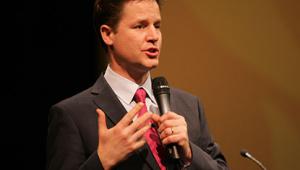14 March 2011
Deputy Prime Minister Nick Clegg made a robust defence of rapid public spending cuts when he addressed his party’s spring conference yesterday.
Speaking in Sheffield on March 13, Clegg told delegates: ‘I didn’t get into politics to balance the books [but] it is what we have to do – so we can do what we want to do.’
He said that last May the UK was borrowing £400m a day. He recognised that, even so, many people thought the government was cutting too rapidly.
‘By cutting the deficit decisively, we have restored confidence in Britain, essential because without confidence there can be no growth,’ Clegg said.
‘We have helped keep interest rates lower for longer, helping families, helping businesses.’
Clegg said the risks of delaying cuts would have been even greater, and attacked Labour for failing to say what it would cut.
He also accused Labour councils of making deliberately damaging cuts so as to give themselves political ammunition in May’s elections.
Clegg said the Liberal Democrat council in Sheffield, where he is an MP, faced an 8% budget cut, but had declared only 270 redundancies and had not closed any children’s centres, libraries or swimming pools.
‘But cross the Pennines into Manchester, a council having to make almost identical savings, [and] you’ll find a Labour council letting nearly 2,000 people go,’ he said.
‘Some people say Labour are making cuts for political reasons. Anyone who sacks a member of staff or shuts down a public service for political purposes is a disgrace to politics and a disgrace to Britain.’
Earlier the conference voted almost unanimously for two amendments that strongly criticised the government’s health reforms.
One condemned ‘any competition based on price’ in the NHS, said private providers should be barred from ‘cherry picking’ patients and called for commissioning and service provision to remain separate to avoid conflicts of interest.
The second urged powers for councils to require any health body to present itself for scrutiny, and that councillors should comprise half of all commissioning consortium boards.



















